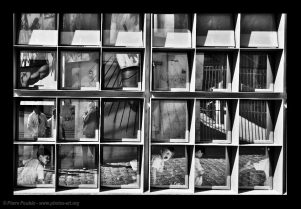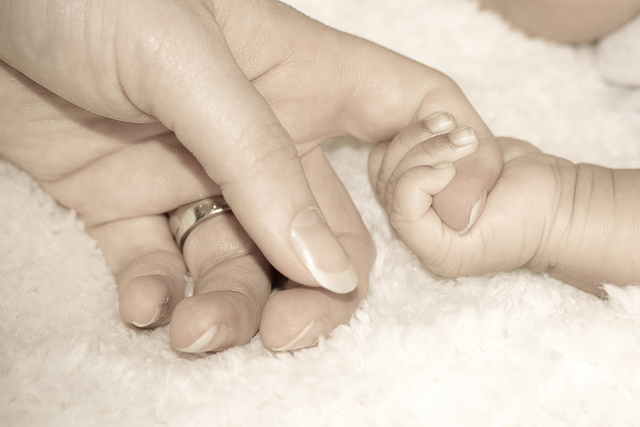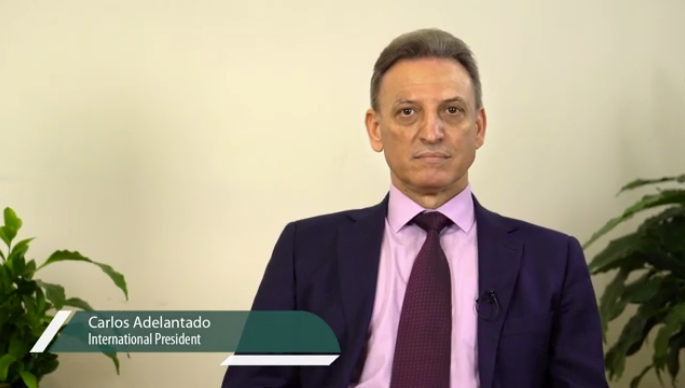A Revolution for the Future
Article By Pierre Poulain

Fragments of Reality, by Pierre Poulain
Do we need to learn from History? On December 3rd I was sitting in front of my laptop, wondering what might be the theme of this article. I didn’t want to write about something that I didn’t believe was important or significant. Usually I let my intuition identify a subject, but on that day, this did not work.
So I began on other tasks…I organized my photos, answered emails, and posted a new Tweet on Twitter (@pierrepoulain). A minute later I got a comment from a young guy on the other side of the world, in Malaysia. We began to chat, and I decided to write an article about this series of Tweets.
The original Tweet was: Instead of trying to change ancient shapes and ideas, we should concentrate our efforts to create a new way of living together.
I got reactions concerning the need to learn History. One would think, “Why bother to learn History, if we need only to look toward the Future“. Some comments dealt with the efficiency of the concept: “With the differences and lack of communication between Religions and Cultures, it seems there is no way to create a new way of living together. One can only change himself on an individual case“.
I believe there is here an idea worth explaining, and since I have more “space” here than 140 characters to develop it, here we go…
It will not be a surprise to say that the world we are living in has become “global”. This globalization was initiated at the Political and Economical levels at the end of the second world war with the predominance of International Institutions built with the aim to establish dialogue and communication at the international level in Politics, Economics, Culture and Education…But all received a huge acceleration at the end of the last century, first with the development of the Internet, and then with Social Networks and Smartphones.
Along with this globalization, the limits of the globalization were also revealed. Physics teaches us that a vector oriented in a specific direction will always produce a reaction in the form of an opposing force, in the opposite direction. Everything in life produces it’s own “opposite-complementary”. So just like we produce our own shadow when we walk under the sun, the advent of globalization produces an opposite force leading to separation an isolation.
And here we are, between two opposite forces, which like the two sides of a coin, can’t live without each other: globalization and isolationism. At first glance they seem to be two very different things: globalization is often seen as the product of the “establishment” where the opposing forces reject the establishment either on the “left” – Anonymous, Snowden, Hackers – on the “right” – populist political movements, like the “Front National” in France, the “FPO” in Austria …or the wave which brought Donald Trump to the presidency in the USA.
This phenomena of dealing with the “two sides of the same coin” is not new. Before globalization and isolationism we had during the last century an opposition between Capitalism and Communism; both also belonging to the same coin. Niether was able to find it’s identity in total independence from it’s “shadow”, the other side of the coin.
In reality the foundations of our society are based on many such pairs of opposites, where one side is always fighting the other one, and where none have proven to offer a real solution and hope for a brighter future.
Let’s review some examples…
We already mentioned “Globalization” and “Isolationism”. The way globalization is implemented does not work. It apparently offers freedom by wiping away borders (as in Europe) for people and goods, but in reality it has enforced a control on personal data with the help of new technologies, it has created a huge system of surveillance and limited individual freedoms worldwide. On the opposite side of the coin, Isolationism leads to separation, as a way to protect individual and/or national freedom, and separation usually leads to opposition and conflict between the parts (Nations, Faiths, Ideologies…).
“Democracy” is often opposed to “Tyranny”, and is presented as the only alternative to the scenario that full power lies in the hands of one egocentric individual…as it is sadly in various countries. But Democracy, as demonstrated lately is far from being the “Panacea Universalis”, the universal remedy, the crown of the political system. Since, in Democracy, power depends on votes, which stand for opinion and not always the good, politicians have two different rhetoric: before the elections… and after. We all remember the famous phrase of Ariel Sharon, the former Israeli Prime Minister, when he said, “From here, things are perceived differently than from there”.
The fact is that this conflicting rhetoric has lead to a situation where people are elected not because of the accuracy, the efficiency, or the wisdom of their propositions. Not even because of their virtues and personal example. They are elected because they say what people would like to hear…and after the election, they usually do what they want to do.
Democracy is presented as the ultimate shield against tyranny, but it has provoked a disinterest, if not a lack of confidence and trust from the people – especially among the young generations – towards politicians, and political issues in general. And this situation is an open invitation to fall into tyranny.
“Secular” is opposed to “Religious”. This is not a recent issue, and here we have a very ancient “coin” to deal with. Sometimes it seems like there are only two options on the table: to believe in the existence of one omnipotent divinity in the image of a human being – thus sharing human virtues and weaknesses – or to reject it entirely, and with it to negate any kind of intelligence in Nature, and purpose of Evolution. At the extreme, one side leads to religious fundamentalism and the other side to a black materialism empty of hope and meaning.
There are more “coins” of course, a lot more, but my aim is not to present an exhaustive list. It is just to show that our world is based on a dual mind, a duality. There is always one side and its opposite. It is, in a way, absolutely normal, or better say “human”, because this is how the human intellect perceives and analyses the world.
But in considering that this dual state of the world is normal, it does not mean that we have to let ourselves be lead by it. After all, we all have emotions, this is normal. But does it mean that we have to let our emotions lead or control us? No, of course. Someone lead by his emotions would usually be considered immature, and unfit to lead others. It is accepted that the intellectual, rational and dual mind has to prevail.
But as we said before, the dual mind has failed to offer a true solution. So why not consider this dual way of considering reality as one way to comprehend the world – like our emotions – but not necessarily the ultimate way. I mean, if we consider evolution as a constant movement, and if we accept that this movement brings changes and transformation, then after thousands of years of “duality” it may be legitimate to ask a simple question: “What is the next step?”
And what possibly can be the next step after Duality, if not Unity?
I strongly believe Duality is part of the past – and still part of our present – and Unity as belonging to our future.
I also strongly believe that the Path from Duality to Unity is not linear. I mean that the dual mind will not “evolve” in some way to perceive the world as unity. Just like our emotions and sentiments didn’t evolve to become ideas and concept. Both exist in parallel.
This means that to reach Unity we need to “jump”, to use, build or awaken a new “mental tool”. A new mind, if I may say so. Or to say it in a simpler way, it is a new manner to perceive ourselves and the world, and to build a relationship between ourselves and the world. This is why I tweeted that it is better to concentrate on the future, than to try to change the past.
But is this even possible? Can we get rid of the dual opposition which is so present in so many aspects of our life?
I believe we can. And I believe that here lies the key of Human Evolution, and the key towards a real brighter collective and individual future.
Duality will always be part of the world, as the dual mind has no other way to perceive reality. But we can fight the illusion of duality as the unique perception of Truth. A famous teaching in Indian philosophy, from the “Bhagavad Gita”, speaks of a young warrior named Arjuna – the archetype of mankind – fighting with the army of the Pandavas – the Virtues – against the countless Kauravas – or human weaknesses.
It is interesting to note that the Virtues, the Pandavas, are 5 brothers – the sons of Pandu – which represent together the fifth principle of the human constitution according to the same ancient philosophy. Let’s just say that this principle is called MANAS – where we find the root MAN, symbolizing what man is IN REALITY – or in potential. And Manas is just another way to use our mind. Manas does not wipe away the differences; it includes all the parts in a wide identity and unity, where each part has its role to play.
Let’s consider for example the human body. Each one of us is a “unity”, but our bodies are made of many different tissues, shapes, fluids and organs. Each has it’s own particularity, but “we” are the unity; which is not just the result of the sum of the components. It’s our identity, our “ego”, our self. Trying to divide it would result in illness, such as schizophrenia, or halving of identity.
Considering this example, I would say that “globalization” means that each part, each organ would share its own specificity with all the others. If our body would have been a global world, then not only the brain but also the heart and lungs would try to think…and the stomach would want to beat like the heart. Of course, the whole would crash.
The same would occur in an “isolationism” model, where the heart would keep it’s beating for itself, without share it’s work with the rest of the body…again, the whole would crash.
The only living model: when all the parts belong to ONE UNITY. Although it is certain that they will not really be conscious of the exact characteristics of this higher identity, each part can accept and find its reason to belong.
Well, I’ll say that the same is true for mankind. For us, this unity is called HUMANITY, and we – as individuals, as nations, as all the faiths and all the ideologies – are all parts of this Humanity. Theoretically, this is easy to understand. But do we IDENTIFY with Humanity? Are we really consciously part of it? I think not…far from it.
Only when we shall be able to place the root of our identity in Humanity shall we be “one”. Thus, as a westerner or easterner, as secular or religious, as Jewish, Buddhist or Muslim, as French, Israeli or Japanese…we shall each “do our part”. But we shall do it as belonging to the same and unique humanity, together forming a unity.
Of course this demands effort; the sacrifice of the immediate and personal interest for the benefit of the whole of humanity…but if we consider that “humanity is us”, then it would not really be such a sacrifice. After all, we shall continue to act for our own benefit.
This is in my opinion the way to the future. This is why I said that the Past should be left to the Past, and we should concentrate on the future, on awaking the Humanity in us.
Is this possible? I believe so. After more than 30 years in Israel leading the school of Philosophy of New Acropolis, and nearly 40 years following the Path of classical philosophy, I have had the chance to see many people, young and not so young, walk the Path and reach a new state of identity. I believe everyone can reach their own humanity, but just to understand it, and to agree with it, is not enough. There is a need to live it. To do it. To be it.
I believe this is the most needed revolution in today’s state of mankind, and I invite all to dare to join this Revolution.
Image Credits: Pierre Poulain
The entity posting this article assumes the responsibility that images used in this article have the requisite permissionsImage References
www.photos-art.org/fragments-of-reality/ © 2016 Pierre Poulain
Permissions required for the publishing of this article have been obtained
Article References
Originally written to for "Acropolis" magazine, published by New Acropolis in Israel (www.newacropolis.org.il), in Hebrew. March 2017.




Philosophy for living at New Acropolis, is for the love of Wisdom Thanks to our Teachers and Team Mr. Guy H, Micheal H and all the Family members ???